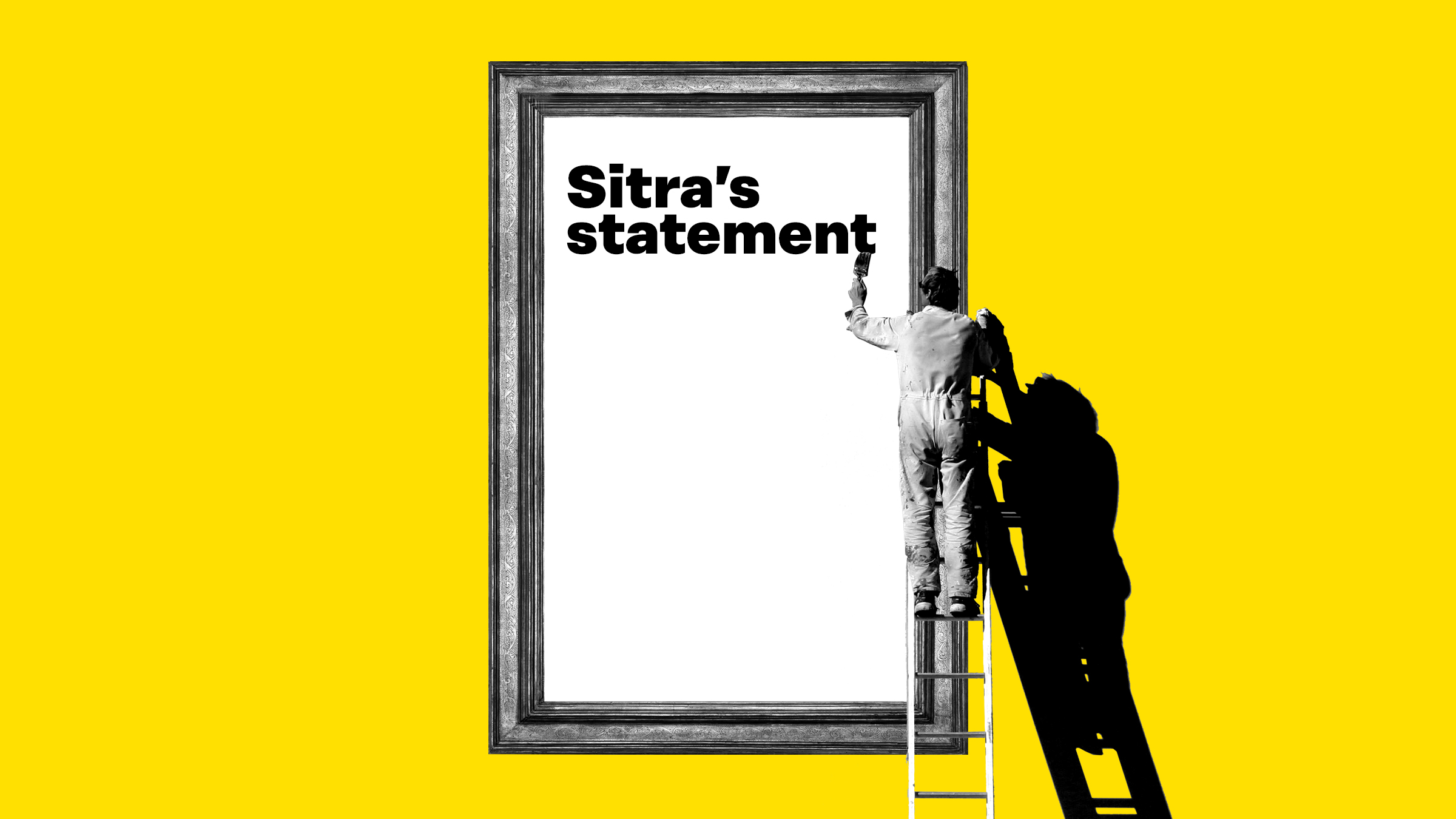The Finnish Innovation Fund Sitra applauds the European Commission for launching this initiative at a time when European democracy is under pressure both externally and internally. We know all too well that the institutions of liberal democracy cannot be taken for granted, and that democracy can be rolled back.
Sitra’s main comments
- The four themes of the Democracy Shield are well chosen. They are interconnected and mutually reinforcing, and action across all of them can significantly strengthen European democracy. In its comments, Sitra focuses primarily on the fourth theme: fostering citizens’ participation and engagement.
- Given the critical role of social media and the growing influence of artificial intelligence (AI) in today’s information landscape, shaping public perceptions, political views and choices, it is essential to continue ensure close alignment of democracy-related actions with those undertaken in the domains of the Data Union, Digital Europe and AI.
- It is also vital to continue and increase funding for democracy actions under the next Multiannual Financial Framework. European democracy can and must be defended, but this requires coordinated action and adequate financial resources at the European level.
Boosting citizen engagement and participation with Civic Tech
Sitra warmly welcomes the “fourth pillar” of the Democracy Shield as effective citizen participation and engagement are prerequisites for the legitimacy of democratic systems. When citizens perceive that institutions do not serve them, or that their voices are not heard, authoritarian narratives and simplistic solutions can become dangerously appealing.
Across EU institutions and many member states, new forms of citizen participation, such as citizens’ panels and dialogues, have been successfully piloted in recent years. To build on these important mechanisms, the next phase in the development of democratic innovations should include at least two key things:
- Combining broad digital mass participation with deeper engagement of small groups, or, in other words, integrating “maxi and mini publics”.
- Strengthening the policy translation, i.e. the influence of use of participatory mechanisms on actual policy decisions.
To scale up participatory democracy and make it mainstream at all levels of governance, stronger European commitment is needed to foster European Civic Tech.
Civic Tech broadly refers to digital tools that are designed from the outset to support democratic interaction, participation, and decision-making. The OECD defines Civic Tech as: “The use of digital technologies to reinforce democracy by enabling the public to be informed, participate in decision and policymaking, and increase governments’ responsiveness and accountability” (OECD 2025, forthcoming). Examples include participation platforms, digital Voting Advice Applications (VAAs, also known as “election compasses”), crowdsourcing tools etc.
European Civic Tech platforms and applications should be considered part of the application layer of technologies where Europe must increase its sovereignty. Ideally, they would both strengthen European democracy and boost European tech sovereignty by fostering a vibrant European Civic Tech ecosystem. In line with “Eurostack” approach, open-source Civic Tech platforms should be promoted. Open-source software can enable decentralised, transparent and interoperable online services that can offer alternatives to today’s centralised platforms and help avoid vendor lock-in. This is not incompatible with competitive markets or commercial business models.
Civic Tech also presents a significant opportunity for European software developers and service providers: the European Civic Tech market has been estimated at around EUR 100 million in 2022, with potential to grow to EUR 500 million by 2027.
In Finland, Sitra has conducted large-scale experiments using an open-source platform called Polis. We have facilitated more than 30 Polis discussions in diverse decision-making contexts from advancing the green transition to improving public services. Interest is growing across all levels of government from municipalities to ministries.
Together with DigiFinland, Sitra has made Polis GDPR-compliant and accessible. (DigiFinland is a public sector company focusing on developing, maintaining and providing national digital services that improve the productivity and effectiveness of healthcare and social welfare services, rescue services and other sectors.) Sitra is also seed-funding an open-source community around Polis to promote collaborative learning, transparency and lower development costs among public users. Our goal is to scale this community to the European level.
Polis empowers citizens in agenda-setting not only by allowing them to vote online, but also by enabling them to submit their own views for others to vote on. Polis has been used at least in the Netherlands, the UK, Taiwan, Germany and the USA. It is just one example; many other platforms exist, both open-source and proprietary. Sitra has also aimed to develop new solutions to increase citizen participation in elections at all administrative levels, including a new open-source platform for Voting Advice Applications (VAAs) and the concept of an Educational Voting Advice Application, both of which have been successfully used to engage young voters ahead of national elections.
However, several bottlenecks remain. Based on Sitra’s observations on the Civic Tech field over the past couple of years across countries, we have identified common challenges. First, public officials often lack awareness and skills to adopt and use Civic Tech tools effectively. Second, there is a shortage of resources and capabilities for collaboration and maintenance of open-source tools. Third, collective learning across Europe is limited, leading to repeated trial-and-error processes in different administrations. There is also insufficient focus on experimentation, research and reflective co-design with public sector entities. Additionally, there is a growing interest in using AI in Civic Tech to reduce human costs and improve analysis and utilisation of the results. Having a common European, value-based and citizen-centric, approach to use of AI in European Civic Tech should be fostered.
On the industry side, Civic Tech companies face several barriers to scaling beyond their home markets, including: First, limited understanding of EU legislation such as GDPR, accessibility requirements, and how to participate in public procurement processes. Second, as about half of the Civic Tech technologies are currently open-source based, better coordination in open-source development and maintenance is needed. Third, concerns around security and privacy, highlighting the need for a European security and privacy infrastructure.
To address these challenges, we propose the creation of a European Civic Tech Hub (CTH). Including the development of the European Civic Tech ecosystem in the Democracy Shield is essential to provide the necessary policy and funding support.
The CTH would be grounded in:
- The European values enshrined in the Treaty and the EU Charter of Fundamental Rights
- Uncompromised compliance from the outset with the EU legislation, including the Digital Markets Act, Digital Services Act, GDPR, AI Act and Interoperability Act.
- A commitment to strengthening technological sovereignty and fostering a thriving European Civic Tech ecosystem.
CTH would operate at the interface of public administrations at all levels, the Civic Tech industry, and citizens. It would support public administrations’ adoption and maintenance of Civic Tech tools, and assisting Civic Tech companies, on a competition-neutral basis, in navigating regulations and expanding beyond national markets. It could also support hosting and maintaining open-source Civic Tech applications that adhere to the foundational principles. The exact service offering would be co-developed and validated with partners and stakeholders.
Democracy requires a healthy media and social media landscape
The first three pillars of the Democracy Shield are closely interlinked. There is no basis for democratic decision-making or fair elections unless citizens have access to facts and quality information. Citizens must be able to have conversations with each other and engage in public discourse without fear of disinformation or manipulation. They need to be able to exercise freedom of speech without fear of facing hate speech and trolling. Our societies are not resilient, if foreign information manipulation and interference are not effectively countered. European efforts across these areas, now under the banner of Democracy Shield, need to be strengthened.
Social media has played an increasingly central role in elections and in the formation of political opinions over recent years as it has become the main source of news for increasing number of people. This is the case particular among young people, who have grown up with smartphones and social media. A recent survey in Finland found that Tik Tok is by far the most popular source of news content among those under 18.
European efforts to ensure a healthy and safe social media environment for democracy is therefore paramount. During the last mandate, a series of EU laws were passed aiming at fostering a safer media space. In particular, the Digital Services Act (DSA) is important as it establishes common EU rules for tackling illegal content as well as preventing and mitigating systemic risks to civic discourse, electoral processes and public security. The DSA must be enforced with vigour. In addition, supportive actions under the Digital Europe, Horizon and CERV programmes aiming at understanding media landscape, reinforcing national actions on media literacy initiatives and efforts to combat misinformation and hate speech are more important than ever.


